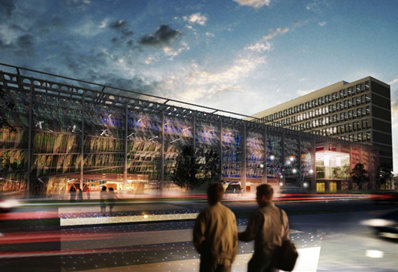Brighton University has been given permission to build its £18 million Advanced Engineering Centre at its Moulsecoomb campus.
The three-story building would, the university said, “enable the provision of enhanced science-led teaching and research facilities.”
The engineering centre will occupy a car park between the Watts and Cockcroft buildings, in Lewes Road, Brighton, at a cost of more than 90 parking places.

The loss of parking was a cause for concern when the application was discussed at the Brighton and Hove City Council Planning Committee at Portslade Town Hall this afternoon (Wednesday 16 September).
But the design, which includes a cantilevered first floor, won praise and the application was unanimously approved.
Late last year the Higher Education Funding Council for England (HEFCE) announced that it would contribute £5 million towards the cost of the project.
The university said at the time: “The centre will provide cutting-edge facilities for mechanical, automotive and aerospace engineering to educate the next generation of professional engineers.
“The centre will incorporate the university’s Centre for Excellence in Internal Combustion Research which earlier this year (2014) received £7 million government backing.
“This Centre of Excellence is being established in partnership with Shoreham-based Ricardo, world leaders in technical and environmental consultancy and specialising in the development of low-carbon vehicle technology.
“Joint collaborative projects include the search for the near-zero emissions internal combustion engine.”
The Advanced Engineering Centre is integral to the university’s £150 million redevelopment scheme for its Moulsecoomb campus which includes Preston Barracks, the university said.
The redevelopment of Preston Barracks is a joint scheme involving the university and the council.
Earlier this year the Coast to Capital Local Enterprise Partnership also agreed to support the scheme with a contribution of £7 million.
The Coast to Capital said: “The centre will generate around 30 to 35 additional research posts, plus 15 additional academic/technical engineering posts to support teaching and will deliver an additional 60 trained engineering graduates per annum into the local employment market.”







